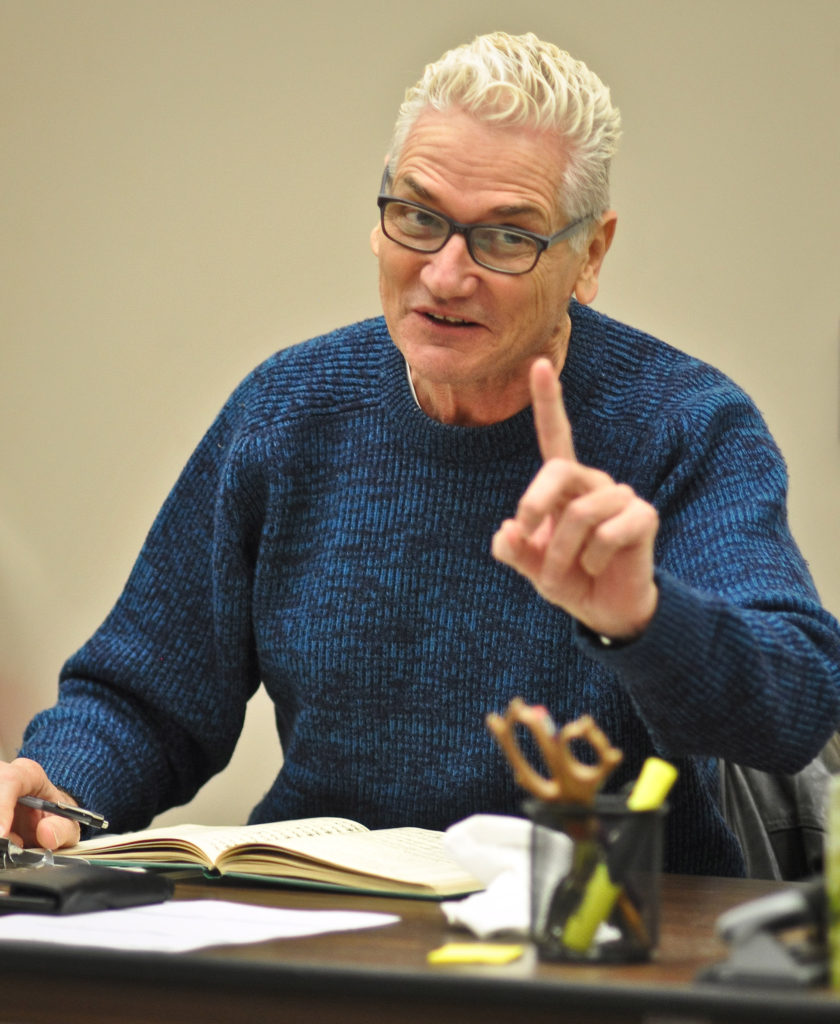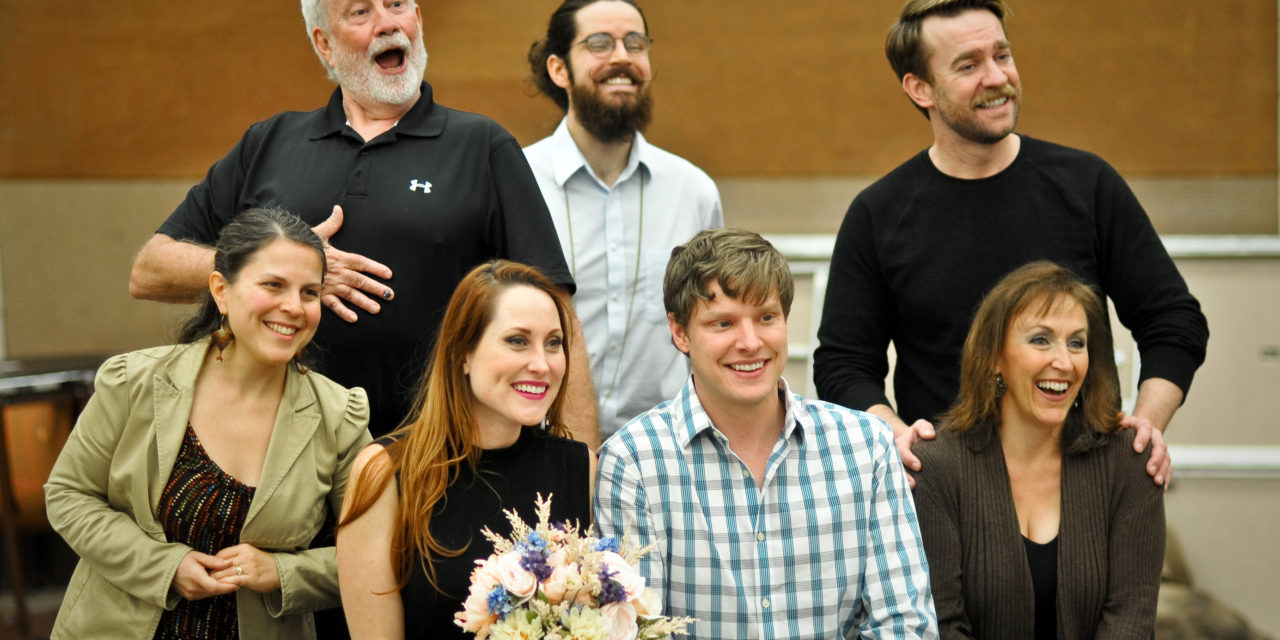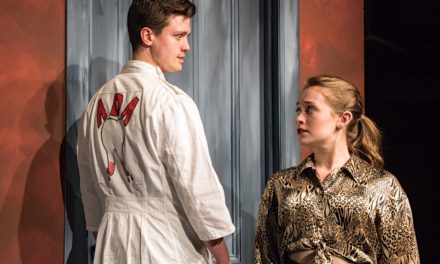(Above: A jolly crew laughed, sang and applauded their way through an early (non-costume) rehearsal for the Eugene Opera’s production of Gilbert & Sullivan’s HMS Pinafore, onstage at the Hult Center for the Performing Arts on Dec. 30 and 31; clockwise from upper left are Jake Gardner, Trevor Cook, Curt Olds, Emily Pulley, Benjamin Robinson, Jessica E. Jones and Jill Switzer; photos by Paul Carter)
By Randi Bjornstad
Assuming the audience has half the fun watching as the cast of HMS Pinafore seems to have rehearsing, the Eugene Opera’s end-of-year production of the rollicking Gilbert & Sullivan operetta should be a great way to see the old year out.
The cast includes some stalwarts in the opera world — among them baritone Jake Gardner as Sir Jacob Porter, soprano Emily Pulley as Little Buttercup, and baritone Curt Olds as Captain Corcoran — but it also introduces promising on-the-way-uppers such as Jessica E. Jones as Josephine and Benjamin Robinson as Ralph Rackstraw.
A few days ago, most of the principal performers, along with conductor Andrew Bisantz , director David Gately, and stage manager Robert Klein, gathered in the band room at Lane Community College for a run-through with just piano accompaniment, makeshift costumes, and boxes and crates instead of furniture.
Even so, it was easy to get into the spirit of the thing, as the singers applauded each other after solos and laughed together as they ironed out foibles in blocking or still uncertain lines.
Part of the ease of putting the show together obviously comes from the attitude of the people in charge of making sure it does.

During a break halfway through the three-hour rehearsal, director Gately prefaced some corrective remarks with, “You did exactly what I told you to do — and I was wrong!”, earning an appreciative laugh from the cast.
Earlier in the day, Bisantz, in his dual roles as conductor and Eugene Opera artistic director, and opera executive director Erika Rauer, sat down to talk about the cast and production of HMS Pinafore.
“Andrew (Bisantz) met both Jessica (Jones) and Ben (Robinson) through young artist programs, Jessica in Florida and Ben in Saratoga, N.Y.,” Rauer said. “It’s wonderful that we can bring stunning new voices here, but it’s also because of Andrew’s connections that we can have such well-established singers that Eugene audiences really enjoy welcoming back again and again.”

In the two years since the Eugene Opera nearly folded after serious financial difficulties, deep organizational changes have brought new vivacity to the program. Those changes included hiring Rauer as executive director, giving Bisantz dual roles as conductor and artistic director, and drastically reining in costs.
“We have been operating on a strict budget of spending only what we have,” Rauer said. “We are continually looking at our budget and figuring out what we can afford to produce on a sustainable base of support. We still dream of things we’d like to do, but we’re building slowly toward those goals with very realistic ideas.”
At the same time, the opera surpassed its fundraising goals last year and hopes to continue to garnering that kind of community support, she said, and one avenue for doing that is working with schools to educate and interest students in the opera.
“I had previous experience working with public schools to promote knowledge of opera, and I found that it takes just a couple of exposures for children to become ‘normalized’ to operatic style and to really want to learn about it and analyze it,” Rauer said. “Opera is about storytelling, and that’s something that everyone appreciates, so we’re trying to bring a lot more of that to the community.”
To help solidify Eugene Opera’s base in the community, the organization has added a half-time development position, grant-writing services, a half-time office manager, and a part-time production manager.
“These are all key positions, and as in many other small opera companies, all these people tend to do parts of different jobs,” Bisantz said. “That allows Erika (Rauer) and me to focus on what we need to do to make the opera successful.”
Bringing in stage managers to handle the last couple of Eugene Opera productions has been one important change, “because they know how the whole process, including rehearsals, should unfold, and they also help to train local people to know what needs to be down and how to do it successfully,” Bisantz said.
Rauer agrees that all the changes have had a positive effect.
“Everything seems much smoother this year,” she said. “I feel I have a much better sense of the whole picture, not only right now but for what needs to be happening months or even a year from now.”
While all of that behind-the-scenes maneuvering is make-it-or-break-it for the opera organization, of course, most of the people who attend simply want to be entertained and educated about the art form that in many ways is a 400-year-old version of musical theater, with acting, singing, and dancing.
A lot of that depends on the skill of the stage managers, who often have a very short time to pull things together. In the case of Eugene Opera’s HMS Pinafore, the task falls to Denver-based Robert Klein, who started out wanting to be an opera singer himself and studied opera performance at the University of Nebraska Lincoln, until tragedy struck in the form of a condition that required vocal chord surgery.
“I had already become interested in stage management, but that made my choice much more clear,” Klein said. “There are programs to study stage management, but I’m a huge believer in learning by doing. So I became a production assistant, then an assistant stage manager, and then a stage manager.”
Even if it’s not what he envisioned originally, “I’m still in the world I feel at home in,” Klein said. “I get to work with tremendous artists, experience beautiful music, still in the professional environment that I wanted to be in.”

In the case of HMS Pinafore, that world takes the audience to 19th-century England, where Josephine, the daughter of a sea captain, falls in love with a low-ranking sailor and is therefore forbidden to develop a relationship with him because her father intends her to marry a First Lord of the Admiralty.
However, Josephine has learned that the knighted gentleman her father prefers supports the concept equality among human beings. His attitude and her respect for him gives her and her would-be lover the courage to declare their feelings — and face the consequences — which of course lead to a happy ending.
HMS Pinafore
When: 2:30 p.m. on Sunday, Dec. 30; 7:30 p.m. on Monday, Dec. 31
Where: Hult Center for the Performing Arts, One Eugene Center (Seventh and Willamette streets in downtown Eugene)
Tickets: $35.25 to $89.50 (some discounts available), at the Hult Center box office, 541-682-5000, or online at hultcenter.org










